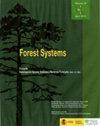Cross species transferability of G-SSR and EST-SSR markers to Neltuma affinis Spreng.
IF 0.7
4区 农林科学
Q3 FORESTRY
引用次数: 0
Abstract
Aim of study: To examine the transferability of G-SSR (genomic simple sequence repeats) and EST-SSR (expressed sequence tag simple sequence repeats) markers developed for several Neltuma species to N. affinis, a species with no genomic data. Area of study: West-Center of Entre Ríos province, Argentina. The set of molecular markers here proposed can be used to analyze samples from the entire species’ distribution range. Material and methods: Twenty-five genomic G-SSRs and eleven EST-SSRs from multiple species were amplified in thirty N. affinis genotypes. Polymorphism, discrimination power and possible deviations from Hardy-Weinberg equilibrium were assessed. Main results: Seventeen highly polymorphic G-SSRs were successfully transferred to N. affinis, with a PIC (polymorphic information content) average value of 0.811 and a He (expected heterozygosity) average value of 0.694; thirteen were validated, showing very low frequencies of null alleles and no linkage disequilibrium. Additionally, seven polymorphic EST-SSRs were transferred. As expected, PIC and He average values were low. Six out of seven markers were validated, and very low frequencies of null alleles and no linkage disequilibrium were observed. Research highlights: This work provides information on the levels of microsatellites’ cross transferability to N. affinis, and its polymorphism degree. Two sets of polymorphic SSRs (genomic and expressed) to study the genetic status of the species are proposed.G-SSR 和 EST-SSR 标记对 Neltuma affinis Spreng 的跨物种可转移性。
研究目的研究针对几个 Neltuma 物种开发的 G-SSR(基因组简单序列重复)和 EST-SSR(表达序列标签简单序列重复)标记对 N. affinis(一种没有基因组数据的物种)的可移植性。研究区域:阿根廷恩特雷里奥斯省西部中心。这里提出的一套分子标记可用于分析整个物种分布区的样本。材料与方法:在 30 个 N. affinis 基因型中扩增了来自多个物种的 25 个基因组 G-SSR 和 11 个 EST-SSR。评估了多态性、鉴别力和可能偏离哈代-温伯格平衡的情况。主要结果:成功将 17 个高多态性 G-SSRs 移植到 N. affinis,其 PIC(多态性信息含量)平均值为 0.811,He(预期杂合度)平均值为 0.694;其中 13 个得到验证,显示出极低的空等位基因频率和无连锁不平衡。此外,还转入了 7 个多态 EST-SSR。不出所料,PIC 和 He 平均值较低。7 个标记中有 6 个得到验证,观察到极低的空等位基因频率和无连锁不平衡。研究亮点:该研究提供了微卫星与胭脂鱼杂交转移性水平及其多态性程度的信息。提出了两组多态性 SSR(基因组和表达)来研究该物种的遗传状况。
本文章由计算机程序翻译,如有差异,请以英文原文为准。
求助全文
约1分钟内获得全文
求助全文
来源期刊

Forest Systems
FORESTRY-
CiteScore
1.40
自引率
14.30%
发文量
30
审稿时长
6-12 weeks
期刊介绍:
Forest Systems is an international peer-reviewed journal. The main aim of Forest Systems is to integrate multidisciplinary research with forest management in complex systems with different social and ecological background
 求助内容:
求助内容: 应助结果提醒方式:
应助结果提醒方式:


